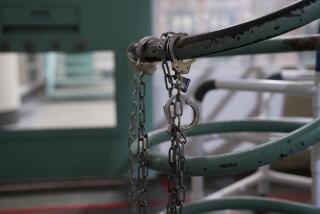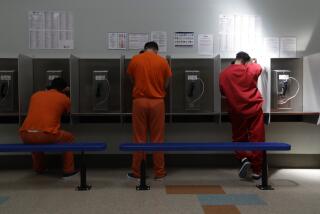Nicaraguan immigrant dies almost a week after trying to commit suicide at Southern California ICE facility
- Share via
Osmar Epifanio Gonzalez-Gadba left his home in Matagalpa, Nicaragua, last October without saying goodbye to his mother.
Five months later, on Tuesday, she got word that he had died from injuries sustained in a suicide attempt at a Southern California immigration detention center.
Through tears, she told Nicaragua’s TN8 news that she hadn’t known where her son was until she was told of his death.
“He was going to run an errand in Managua and didn’t return,” his sister Estela Gonzalez-Gadba told the news outlet.
She told another media outlet in Nicaragua that he had left home without a suitcase or any other belongings.
Gonzalez-Gadba, 32, was found hanging in his cell March 22 by an employee during a routine evening check. After cutting Gonzalez-Gadba down, the employee alerted medical staff at the Adelanto Detention Facility and the inmate was taken to the nearby Victor Valley Global Medical Center.
(At least one media outlet in Nicaragua spelled his name Gonzalez Gadea).
He died after almost a week on life support. His is the first detainee death connected to the facility since December 2015 and he is the fifth detainee to die in the custody of U.S. Immigration and Customs Enforcement this fiscal year.
Adelanto is the largest ICE facility in California, with a daily population averaging more than 1,900 detainees, said ICE spokeswoman Virginia Kice.
Kice said Gonzalez-Gadba requested to be placed in segregation but declined to say why or when pending further investigation. ICE facilities have administrative and punitive segregation. According to the agency’s detention standards, detainees can be placed in administrative segregation for their safety or the safety of others, for medical reasons or other factors related to security.
Detainees typically request protective custody if they are victims of assault by other detainees, are informants or witnesses, are sexual predators, are victims of alleged intimidation, appear to be in danger or claim to be former law enforcement officers. They can also decline to provide a reason.
Kice said Gonzalez-Gadba had no criminal history.
ICE statistics show that Nicaraguans make up less than half of 1% of all deportations. Last fiscal year, 795 people were deported to Nicaragua, compared with 149,821 who were deported to Mexico. Guatemala, Honduras and El Salvador held the second-, third- and fourth-highest removal rates, respectively.
Despite the surge of Central Americans at the U.S. border in recent years, Nicaraguans have migrated in much tinier numbers. The country does have many of the same problems as other Central American countries, including extreme poverty, joblessness, violence and government repression.
But the brutal gangs and drug traffickers that control large swaths of Honduras, El Salvador, Guatemala and Mexico haven’t permeated Nicaragua. The country is also next to Costa Rica, the most stable Central American nation, and many Nicaraguans have emigrated there for better-paying jobs.
Gonzalez-Gadba was arrested by U.S. Border Patrol agents Dec. 29, 2016, while attempting to reenter the country. He was just north of the U.S.-Mexican border in the Otay Mesa neighborhood of San Diego. He had previously been deported to Nicaragua in April 2016, according to the Department of Homeland Security.
He made three attempts to enter the U.S. without documents, according to the TN8 report. Before that, he had been self-employed in Nicaragua.
After his death, ICE officials asked Nicaraguan consular representatives for help notifying his family. Reached by phone, a consulate representative declined to provide any information about Gonzalez-Gadba.
But his mother and other family members expressed their gratitude to the government for their help, according to the TN8 story. The news outlet reported that Gonzalez-Gadba’s repatriation is in process.
More to Read
Sign up for Essential California
The most important California stories and recommendations in your inbox every morning.
You may occasionally receive promotional content from the Los Angeles Times.










